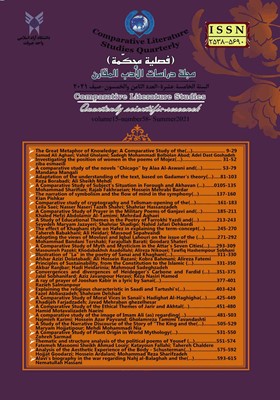A Comparative Study of Subject's Situation in Forough and Akhavan Literature with Emphasis on Another Birth and Winter
Subject Areas : شعر
Mohammad Sharifian
1
*
![]() ,
Rajab Fakhraeian
2
,
Hossein Mehrabi Bardar
3
,
Rajab Fakhraeian
2
,
Hossein Mehrabi Bardar
3
![]()
1 - PhD and 17th grade assistant professor of university and faculty member of Islamic Azad University, Shirvan Branch
2 - Faculty member of Islamic Azad University, Shirvan Branch, 18th grade Assistant Professor
3 - PhD Student in Persian Language and Literature, Department of Persian Language and Literature, Shirvan Branch, Islamic Azad University, Shirvan-Iran
Keywords: Subject, meanings, Akhavan, Forough Farrokhzad, meanings science,
Abstract :
In the field of aesthetics of literary works, a lot of research has been conducted, but these works less has been considered from the perspective of semantics. In the present article, using a descriptive-comparative method and based on library sources, secondary intentions in the rhetorical application of the subject situation in mentioning or deleting, introducing or not, presenting or delaying and focusing, adjectives and constraints are analyzed based on rhetorical science books. The analysis of "Another Birth" and "Winter" shows that the mention of subject is important to Forough and Akhavan more than its omission, and it seems that in both cases of omission or mention, their goal is often to convey the content in the shortest time with the most emphasis. In presenting and delaying the subject, the presentation of subject is more important than the delay, and he has used the presentation and delay of the subject for the purposes of "placing the subject in the mind of the addressee" and expressing "pain and sorrow." Forough and Akhavan, for more emphasis, introduce subject by adding a name, pronoun or adjective, and have used Nakareh subject less than Maarefa subject.
کتابنامه
اخوان ثالث، مهدی. 1376ش، زمستان، تهران: مروارید.
انوری، حسن. 1367ش، دستور زبان فارسی(1)، چاپ اول، تهران: دانشگاه پیام نور.
رجایی، محمد خلیل. 1353ش، معالم البلاغة، شیراز: دانشگاه شیراز.
سکاکی، ابویعقوب. بی تا، مفتاح العلوم، دمشق: دار الحکمه.
شمیسا، سیروس. 1373ش، معانی، تهران: میترا.
علوی مقدم، محمد و رضا اشرف زاده. 1390ش، معانی و بیان، تهران: سمت.
فرخزاد، فروغ. 1383ش، پنج کتاب فروغ فرخزاد به همراه زندگینامه، تهران: فرشید.
فرشید ورد، خسرو. 1387ش، دستور مختصر تاریخی زبان فارسی، تهران: زوار.
کزازی، میرجلال الدین. 1370ش، معانی(زیباشناسی سخن پارسی)، تهران: نشر مرکز.
همایی، جلال الدین. 1354ش، فنون بلاغت و صناعات ادبی، دانشگاه سپاهان انقلاب.
مقالات
بهنام، رسول و سیروس شمیسا. 1389ش، «بررسی احوال مسندالیه در کتاب راحة الصدور و آیة السرور»، فصلنامه ادبیات فارسی، بهار و تابستان، شماره 15.
ثابت، نیره و حمید طاهری. 1398ش، «بررسی نقش همخوانها در آفرینش فضای حزن و گریه»، ادبیات تطبیقی جیرفت، دانشگاه آزاد جیرفت.
طاهری، حمید و راضیه ایمانی و پیمان منصوری. 1393ش، «بررسی مسندالیه ضمیر در اشعار شاملو».
_||_Akhavan Sales, Mehdi. 1997, Winter, Tehran: Morvarid.
Anwari, Hassan 1988, Persian Grammar (1), First Edition, Tehran: Payame Noor University.
Rajaee, Mohammad Khalil 1974, Ma'alem al-Balaghah, Shiraz: Shiraz University.
Sakaki, Abu Yaqub. Bi Ta, Meftah al-Oloom, Damascus: Dar al-Hekma.
Shamisa, Sirus. 1994, Maani, Tehran: Mitra.
Alavi Moghadam, Mohammad and Reza Ashrafzadeh. 2011, Meanings and Expression, Tehran: Samt. Farrokhzad, Forough. 2004, five books by Forough Farrokhzad along with biography, Tehran: Farshid. Farshid Word, Khosrow. 2008, A Brief Historical Grammar of the Persian Language, Tehran: Zavar. Kazazi, Mir Jalaluddin 1991, Meanings (Aesthetics of Persian Speech), Tehran: Markaz Publishing. Homayi, Jalaluddin 1975, Rhetoric Techniques and Literary Crafts, Sepahan University of the Revolution.
Articles
Behnam, Rasool and Sirus Shamisa. 2010, "A Study of the Subject's situation in the Book of Raha al-Sodur and Ayat al-Sarwar", Persian Literature Quarterly, Spring and Summer, No. 15.
Sabet, Nayreh and Hamid Taheri. 2019, "Study of the role of consonants in creating an atmosphere of grief and crying", Comparative Literature of Jiroft, Jiroft Azad University.
Taheri, Hamid and Razieh Imani and Peyman Mansouri. 2014, "A Study of the Pronoun in Shamloo's Poems".

